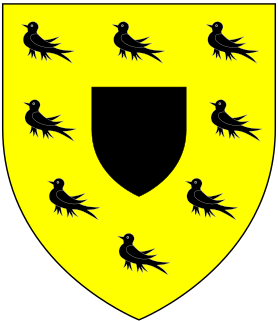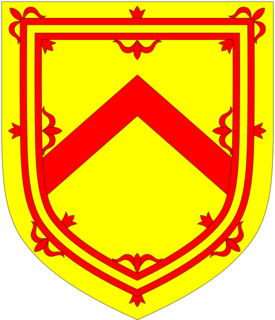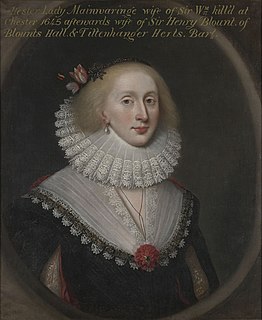Sir John Barrington, 3rd Baronet of Barrington Hall, Essex was an English lawyer and politician who sat in the House of Commons at various times between 1645 and 1679.
Sir Robert Brown, 1st Baronet was a British politician and merchant.

Sir William Brownlow, 1st Baronet of Humby in Lincolnshire, was an English politician and barrister.
Sir Edmund Bacon, 2nd Baronet was an English baronet and politician. He was a very wealthy man. Having around £6,000. During Edmund's life he would have many intellectual pursuits. Edmund Bacon would often talk to his uncle, Francis Bacon about his scientific experiments. Edmund's love of knowledge was the reason he was friends with Sir Henry Wotton. Edmund's beliefs about religion are unknown, although he was described by a Puritan chaplain named Robert Allen as "Lovers of piety and justice, and friends to the church of God."

The Samwell Baronetcy, of Upton in the County of Northampton, was a title in the Baronetage of England. It was created on 22 December 1675 Thomas Samwell, later Member of Parliament for Northamptonshire and Northampton. He was the great-grandson of Sir William Samwell, Auditor of the Exchequer to Queen Elizabeth I of England. The second Baronet sat as Member of Parliament for Coventry. On the death of the fourth Baronet in 1789, the title became extinct.

The Baronetcy of Mainwaring of Over-Peover has twice been created for members of the family of Mainwaring of Over-Peover, Cheshire. It was created on 22 November 1660 by Charles II on his restoration, for Thomas Mainwaring, High Sheriff of Cheshire in 1657 and Knight of the Shire otherwise Member of Parliament for Cheshire in 1660. The baronetcy was extinct on the death of the 4th Baronet. However his widow remarried and her son by the second marriage Thomas Weterall eventually inherited the Mainwaring Cheshire estate and changed his surname to Mainwaring. The baronetcy was recreated in the Baronetage of the United Kingdom on 26 May 1804 for Henry Mainwaring, son of Thomas Weterall Mainwaring. It was extinct on the death of the 5th Baronet in 1934.

There have been six baronetcies created for members of the Corbet family, four in the Baronetage of England, one in the Baronetage of Great Britain and one in the Baronetage of the United Kingdom. All creations are extinct. The recipients were descendants of the ancient Norman family of Corbet which held substantial estates in Shropshire including Wattlesborough, Caus Castle, Moreton Corbet Castle and Acton Reynald Hall.
The Baronetcy of Goodricke of Ribston was created in the Baronetage of England by King Charles I on 14 August 1641 for his loyal supporter John Goodricke of Ribston, Yorkshire. He represented Yorkshire in the Cavalier Parliament from 1661 to his death.
Sir John Delaval, 3rd Baronet was an English politician.

Sir Robert Bacon, 3rd Baronet of Redgrave (1574–1655) was an English politician.
Sir Thomas Beaumont, 1st Baronet was an English politician.

Tyttenhanger House is a 17th-century country mansion, now converted into commercial offices, at Tyttenhanger, near St Albans, Hertfordshire. It is a Grade I listed building.
There have been two baronetcies created in the Baronetage of England for members of the Culpeper family of Kent and Sussex. Both are extinct.

Sir Thomas Spring, 3rd Baronet of Pakenham Hall in Pakenham, Suffolk, was an English baronet and landowner who served as High Sheriff of Suffolk in 1696.

Sir John Fleming, 1st Baronet was an Irish baronet, created first Baronet Fleming. of Brompton Park in the County of Middlesex in the Baronetage of Great Britain on 22 April 1763.

Sir Thomas Pope Blount, 1st Baronet was an English politician and baronet.
There have been two baronetcies granted to the Willises of Fen Ditton, both in the Baronetage of England. The Willis Baronetcy, of Fen Ditton in Cambridgeshire, was first created in the Baronetage of England on 15 December 1641 for Thomas Willis, son and heir of Inner Temple barrister and landowner Richard Willys, of Fen Ditton and Horningsey, Cambridgeshire, by Jane, daughter and heir of William Henmarsh, of Ball's Park, in Ware, Hertfordshire. Richard's brother, Thomas, was Clerk of the Crown in Chancery.

The Blackham Baronetcy, of London, was a title in the Baronetage of England. It was created on 13 April 1696 by King William III for Richard Blackham, a woollen manufacturer and a Turkey merchant. The title became extinct on the death of his son the second Baronet John Blackham in 1728.
Sir Benjamin Ayloffe, 2nd Baronet was an English landowner and politician who sat in the House of Commons from 1661 to 1662. He supported the Royalist cause in the English Civil War.

The Astley Baronetcy, of Patshull in the County of Stafford, was created in the Baronetage of England on 13 August 1662 for Richard Astley. The second Baronet represented Shrewsbury and Shropshire in the House of Commons. The title became extinct on his death in 1772.











